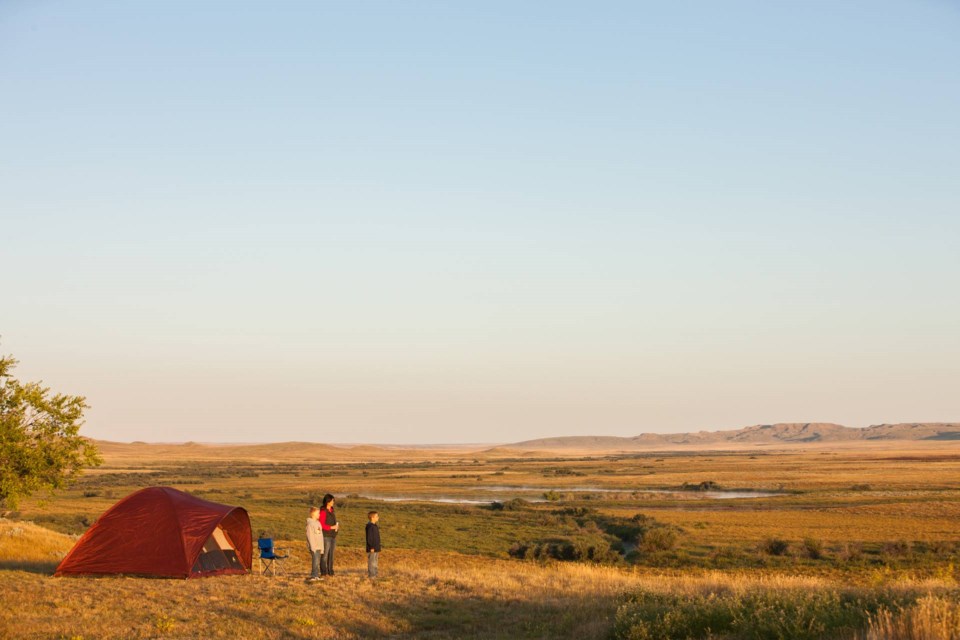PRINCE ALBERT — Reservations for camping in Prince Albert National Park and Grasslands National Park open on March 28 at 8 a.m.
Reservations are strongly recommended, especially in the peak summer season and on weekends.
In Prince Albert National Park, visitors can make reservations for Beaver Glen Campground or Red Deer Campground. The reservation period is May 20 to Oct. 9.
In Grasslands National Park, campsites included in the reservation service are Frenchman Valley Campground, Rock Creek Campground and backcountry camping; the reservation period is May 1 to Oct. 9.
Reserve 2023 online at www.reservation.parkscanada.gc.ca or by calling 1-877-737-3783.
Visit Prince Albert National Park this spring to feel rejuvenated.
As daylight hours increase and the weather warms up in Prince Albert National Park, the melting snow and ice bring new growth and excitement. Spring is a great time of year to visit Prince Albert National Park, especially without the crowds and bugs.
Explore the wilderness of the park and get active by adventuring on a trail. As the weather changes, trail opportunities will shift from cross-country skiing and snowshoeing to hiking and cycling. Check trail conditions or contact the Visitor Centre before heading out to ensure that your gear matches the conditions.
Enjoy a shoulder season camping experience. The park offers drive-in camping in spring – please contact the Visitor Centre for more information about the current offer as spring progresses. There are also several designated backcountry campgrounds to explore. Register and pay for camping fees at the Visitor Centre before any overnight excursion.
Keep an eye out for wildlife and their tracks. Forests and shorelines offer the perfect opportunity to watch for mammals such as elk, deer, wolf and fox and to listen for the hardy birds that stay in the park through the year. Remember to keep a safe distance from all wildlife. If you are affecting their behaviour - if wildlife stops what they are doing and moves or changes their behaviour - you are too close and should give them more space.
Set up a family meal and have a picnic at an enclosed picnic shelter. Picnic shelters are located at the Main Beach across from the Visitor Centre, Paignton Beach, Birch Bay and Southend Campground on Kingsmere Lake. Each shelter has a wood stove for warmth and meal preparation, making them the perfect sanctuary for a picnic. Firewood is provided.
Heated washrooms with running water are available in the Visitor Centre and Waskesiu Beach 24 hours a day. The Waskesiu Beach complex also offers showers.
As winter transitions into spring, the weather can change abruptly in the park. Overall warming temperatures create icy road conditions, variable lake ice thickness and increase human-wildlife encounters.
Take these steps to ensure your next visit to Prince Albert National Park is a safe and enjoyable one:
· Check the Important Bulletins page on the park website. Critical safety messages and notifications about projects that may affect your visit are located here.
· Check the weather forecast and plan for weather changes.
· Inform friends or family of travel plans and file a trip plan with them. Plan to travel and camp with a group.
· Pack essential items such as adequate food, water and clothing.
· Equip yourself with the appropriate outdoor knowledge and skills, including how to use your safety gear and how to start a fire
· Plan your gas stops ahead of time. The only gas station near the east entrance of the park is located at the intersection of Hwy #2 and Hwy #264 and is open year-round. A full tank of gas will help you make the most of your visit.
When visitors are in Prince Albert National Park:
· Prepare for minimal cellular service. Do not rely on your cell phone as there are areas in the park that do not have service.
· Stay on land and keep pets on leash – lake ice is thin this time of year.
· Take precautions when travelling by car or foot. Melting snow can cause icy conditions.
Take responsibility and help keep wildlife wild in the park. Do not feed wildlife. Remain in your vehicle and obey speed limits, especially if you see wildlife on or near the road.
— submitted by Parks Canada




